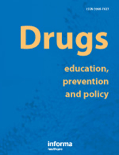
DRUGS-EDUCATION PREVENTION AND POLICY
Scope & Guideline
Shaping the future of drug policy with scholarly rigor.
Introduction
Aims and Scopes
- Interdisciplinary Research on Drug Use:
The journal focuses on contributions that integrate insights from sociology, psychology, public health, and policy studies to better understand drug use patterns and their implications. - Harm Reduction Strategies:
A core aim of the journal is to promote research on harm reduction approaches that minimize the negative health, social, and legal impacts associated with drug use. - Policy Analysis and Development:
The journal provides a platform for critical analysis of existing drug policies and the development of innovative policy solutions that are informed by evidence and community needs. - Youth and Community Engagement:
Research emphasizing the experiences and needs of young people and communities affected by drug use is a significant focus, aiming to enhance education and prevention efforts. - Cultural and Gender Dynamics in Substance Use:
The journal explores how cultural, social, and gender dynamics shape substance use behaviors and perceptions, contributing to nuanced understandings of addiction and recovery.
Trending and Emerging
- Digital and Online Drug Cultures:
Research exploring the influence of digital environments on drug use behaviors, including online communities and the marketing of substances, is gaining traction and reflects contemporary drug culture. - Intersectionality in Substance Use:
Increasing attention is being paid to how various identities (gender, race, socio-economic status) intersect and affect experiences related to substance use, treatment, and recovery. - Impact of COVID-19 on Substance Use Trends:
The pandemic's influence on drug use patterns, treatment accessibility, and harm reduction practices is a prominent theme, highlighting the need for adaptive strategies in public health responses. - Community-Based Recovery Models:
Emerging research focuses on community-led recovery initiatives, emphasizing the importance of social support networks and local engagement in the recovery process. - Psychedelic-Assisted Therapies:
Growing interest in the therapeutic potential of psychedelics for mental health treatment is reflected in recent publications, indicating a shift towards integrating these substances into clinical practice.
Declining or Waning
- Traditional Drug Use Prevention Models:
There has been a noticeable decrease in research centered around traditional drug use prevention models, as the field shifts towards more holistic and community-based approaches. - Stigmatization Studies:
While stigma remains a relevant topic, studies specifically focused on stigmatization without addressing the broader socio-political contexts are becoming less frequent. - Biological Determinism in Addiction Research:
Research emphasizing biological determinism in addiction is waning, as the field increasingly acknowledges the complex interplay of social, environmental, and psychological factors. - Purely Quantitative Drug Use Surveys:
There is a declining interest in purely quantitative surveys that do not incorporate qualitative insights or community engagement, reflecting a shift towards mixed-methods approaches. - Focus on Illicit Drugs Over Legal Substances:
Research on illicit drugs is gradually being balanced with studies addressing the implications of legal substances such as alcohol and tobacco, indicating a broader scope of substance use research.
Similar Journals
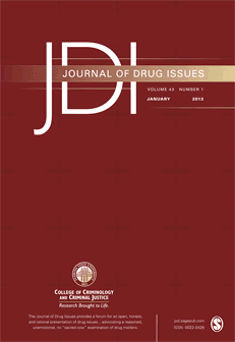
JOURNAL OF DRUG ISSUES
Advancing Knowledge in Drug ResearchJOURNAL OF DRUG ISSUES, published by SAGE PUBLICATIONS INC, serves as a pivotal platform for researchers and professionals dedicated to the multifaceted exploration of drug-related topics across various fields, including health, medicine, psychiatry, and public health. With an ISSN of 0022-0426 and an E-ISSN of 1945-1369, this esteemed journal has maintained a consistent output since its inception in 1971 and is set to continue its contributions through 2024. Reflecting its high academic standards, it has achieved a Q2 ranking in Health (Social Science) and Q3 rankings in several related categories, underscoring its relevance and influence among scholarly work. The journal is indexed in Scopus, with respectable rankings in various medical and health-related disciplines, highlighting its role as an essential resource for those invested in the vigorous discourse surrounding drug issues. Although not an open-access publication, the journal ensures that access to its extensive research findings remains available to a broad audience, solidifying its importance in advancing knowledge and informing best practices in the field.

Administracao Publica e Gestao Social
Fostering collaboration in public administration and social management.Administracao Publica e Gestao Social is a leading academic journal dedicated to the fields of public administration and social management, published by UNIV FEDERAL VICOSA in Brazil. With an ISSN of 2175-5787, this Open Access journal has been a vibrant resource for researchers and practitioners since its establishment in 2009, aiming to foster knowledge exchange and collaboration in the public sector. The journal focuses on illuminating the intersections between administrative practices and social policies, offering a platform for original research, case studies, and theoretical discussions that contribute to the advancement of effective governance and community engagement. By promoting open access scholarship, it ensures that invaluable insights are available to a global audience, ultimately influencing public policy and administration practices worldwide.
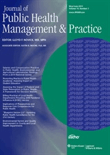
JOURNAL OF PUBLIC HEALTH MANAGEMENT AND PRACTICE
Fostering Expertise in Health Management and PolicyJOURNAL OF PUBLIC HEALTH MANAGEMENT AND PRACTICE, published by Lippincott Williams & Wilkins, stands as a pivotal resource in the fields of Health Policy and Public Health. With an ISSN of 1078-4659 and an E-ISSN of 1550-5022, this journal has been disseminating high-quality research since its inception in 1995, serving a global audience from its base in the United States. Renowned for its contributions, it holds a respectable ranking within the Scopus database, positioned in the 55th percentile for both Public Health, Environmental and Occupational Health, and Health Policy. The journal’s focus is to provide a platform for scholarly articles that enhance the practice of public health management, making it an essential read for researchers, practitioners, and students alike. By fostering a community of informed professionals, the journal aims to bridge the gap between theory and practice, ensuring that advancements in public health are effectively addressed and disseminated.
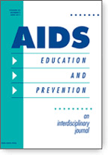
AIDS EDUCATION AND PREVENTION
Bridging Knowledge Gaps in HIV PreventionAIDS Education and Prevention is a distinguished journal dedicated to the exploration of strategies for HIV/AIDS education, prevention, intervention, and policy. Published by Guilford Publications Inc, this journal has been a pivotal resource in the fields of Health (social science), Infectious Diseases, Medicine, and Public Health since its inception in 1989, and continues to be influential through 2024. With its respectable placement in the Q2 category across multiple disciplines, it offers high-impact research and practical insights that are essential for researchers, healthcare professionals, and students alike. Although not an Open Access journal, its compelling content and strict peer-review processes ensure that published works maintain high academic standards. The journal's contributions are integral in addressing the challenges surrounding HIV prevention and education, fostering a deeper understanding and knowledge that can lead to effective community responses.
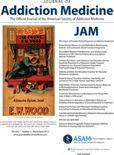
Journal of Addiction Medicine
Elevating Knowledge in the Field of AddictionWelcome to the Journal of Addiction Medicine, a premier academic resource devoted to the field of addiction studies, published by LIPPINCOTT WILLIAMS & WILKINS. Since its inception in 2007, this esteemed journal has become a leader in disseminating groundbreaking research, with impressive rankings in the Q1 quartile across key disciplines such as Medicine (Miscellaneous), Pharmacology (Medical), and Psychiatry and Mental Health, reflecting its significance in the scholarly community. With an ISSN of 1932-0620 and an E-ISSN of 1935-3227, it caters to a diverse audience of researchers, clinicians, and students seeking to expand their understanding of addiction medicine. The journal's articles are primarily published in a non-open access format, ensuring high-quality research is accessible through institutional subscriptions. With a Scopus ranking that positions it within the top tiers of several relevant categories, the Journal of Addiction Medicine is essential for anyone committed to advancing knowledge in the field and addressing the complexities surrounding addiction.

International Journal of Mental Health and Addiction
Navigating the Complexities of Mental Health and AddictionThe International Journal of Mental Health and Addiction, published by Springer, stands as a premier resource within the field of psychiatry and mental health. With an impressive impact factor placing it in the Q1 category and ranking #17 out of 567 journals in its discipline according to Scopus, this journal plays a crucial role in advancing scholarly research and practices related to mental health and addiction. Since its inception in 2006, the journal has committed to disseminating high-quality, peer-reviewed work that addresses contemporary challenges in mental health, including innovative treatment strategies, policy implications, and psychosocial dynamics. Operating from New York, USA, the journal also aims to foster interdisciplinary collaboration, providing a platform for researchers, clinicians, and policymakers. While it does not offer open access, the publication is dedicated to making impactful research accessible to its audience by ensuring that content is widely disseminated. The International Journal of Mental Health and Addiction, with its rigorous editorial standards and dedication to mental health advancement, remains an essential journal for anyone pursuing knowledge in the ever-evolving landscape of mental health and addiction.
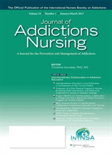
Journal of Addictions Nursing
Innovating Approaches in Addictions NursingThe Journal of Addictions Nursing, published by Lippincott Williams & Wilkins, serves as a pivotal resource in the field of psychiatric and mental health nursing. With an ISSN of 1088-4602 and an E-ISSN of 1548-7148, this esteemed journal has been dedicated to advancing the knowledge and practice of addiction nursing since its inception in 1989. As of 2023, it ranks in the Q3 category of psychiatry and mental health, highlighting its significance amidst its peers. The journal provides a platform for the dissemination of original research, reviews, and clinical practices that address the complexities of addiction treatment and care. While it currently does not offer open access options, its valuable insights are accessible to practitioners and researchers committed to improving patient outcomes. With content spanning from 1989 to 2024, the journal continues to shape the discourse in this vital area of nursing, making it an essential read for professionals and scholars aiming to stay at the forefront of addiction nursing and intervention strategies.
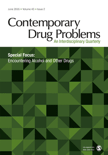
CONTEMPORARY DRUG PROBLEMS
Examining the Multifaceted Challenges of Drug UseCONTEMPORARY DRUG PROBLEMS is a distinguished academic journal published by SAGE PUBLICATIONS INC, focusing on critical issues within the realms of drug policy, health advocacy, and law. With a legacy dating back to its inception in 1973 and a noticeable convergence in subsequent years, the journal serves as a vital forum for researchers, practitioners, and policymakers engaged in understanding the multifaceted challenges related to drug use and its societal impacts. Holding an impressive Q2 ranking in both Health Policy and Health (social science), and a Q1 distinction in Law, the journal positions itself as an essential resource for advancing knowledge and fostering dialogue in these essential fields. Although it operates under traditional access models, its wide-ranging insights make it indispensable for those who aim to contribute meaningfully to the discourse surrounding contemporary drug issues. With its robust Scopus rankings, including a significant 89th percentile in Social Sciences Law, CONTEMPORARY DRUG PROBLEMS remains a pivotal source for scholars and professionals alike, striving to address and mitigate the complexities of drug-related problems on both a legal and social front.

Journal of Social Work Practice in the Addictions
Empowering practitioners through evidence-based insights.The Journal of Social Work Practice in the Addictions is a pivotal publication in the field of social work, dedicated to addressing the multifaceted challenges of addiction through rigorous research and practice. Published by Routledge Journals, Taylor & Francis Ltd, this journal has been a valuable resource since its inception in 2001 and continues to provide vital insights as it converges towards 2024. With a focus on empirical studies, theoretical advancements, and innovative practice approaches, it serves professionals and researchers alike who are engaged in the health and social sciences. Holding a respectable Q3 quartile ranking in both Health (Social Science) and Rehabilitation and a Q4 ranking in Social Work, it emphasizes the importance of interdisciplinary collaboration in tackling issues of addiction. The journal does not currently offer open access, ensuring exclusive dissemination to its dedicated readership, which includes practitioners, scholars, and students committed to improving outcomes for individuals affected by substance use disorders. As an essential platform within the community, it fosters knowledge exchange and supports evidence-based practice, thereby enhancing the field’s collective understanding of addiction-related challenges.
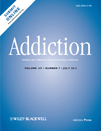
ADDICTION
Leading the way in addiction scholarship since 1993.ADDICTION, published by Wiley, is a highly regarded academic journal that serves the vibrant fields of Medicine and Psychiatry and Mental Health. With an impressive impact factor reflective of its significance—ranking in the top 8% and 7.5% of its categories respectively—this journal is esteemed for its rigorous peer-reviewed research which spans a wide array of topics related to addiction, including pharmacology, prevention, and treatment modalities. Since its inception in 1993, ADDICTION has continually provided a platform for innovative research, shaping the discourse and influencing clinical practices worldwide. This journal, based in the United Kingdom at a prestigious location in Hoboken, NJ, stands as a beacon for researchers, practitioners, and students alike, committed to advancing understanding and strategies to combat addiction-related challenges. Although it is not an Open Access publication, the journal's contribution to the field remains invaluable, ensuring that cutting-edge findings are disseminated widely among professionals dedicated to improving mental health outcomes.